- Home
- Bronwyn Scott
Marrying the Rebellious Miss Page 10
Marrying the Rebellious Miss Read online
Page 10
Bea gave a soft laugh, trying to imagine this very masculine man gossiping with a flowery teacup in hand. But no matter how incongruous the image might be, he would do that. She knew it. Because he was loyal and true, perhaps too loyal for his own good. ‘You’ve bought me enough respectability. Tomorrow is proof of that, I think. You won’t need to play nursemaid any more.’
‘Is that what I’m doing?’ Preston’s response was a swift growl.
Beatrice stopped walking and looked down at her hands. ‘I know what you’ve been doing, Preston. You and the others have been cloaking me in your own respectability. I’m grateful, but I’ll have to stand on my own feet, and I’m sure you have better things to do with your time.’
His mind registered disbelief. She was dismissing him, trying to give him his congé. ‘Maybe I don’t want to stop.’ The words fell heavy between them. Now they were getting to the heart of these visits, to the heart of what lingered beneath the surface of who they were becoming—not just one friend looking out for another in a difficult time—but something more they hadn’t dared to define yet. Preston was certain ‘helpful friends’ didn’t want to push one another up against trees and silence their protests with kisses. Yet that was all he wanted to do to stop her mouth, to stop her worries; press his mouth against hers, his body against hers. It had been a week since he’d kissed her in the inn room and his body was starving for another taste. As was hers.
He’d felt the current between them when he’d come with May and the others. He’d caught Bea’s unguarded gaze on more than one occasion this week when they’d walked alone, yet here she was, trying to warn him off. ‘You should want to stop,’ Bea continued. ‘There is such a thing as too much respectability. If you continue to visit, people will start to think your esteem means something more than perhaps what you intend.’
It was difficult for her to meet his eyes as she said the last, perhaps the idea too intimate. Preston gave a wry grin, forcing her to own her thoughts. ‘Why is that? What do I intend?’
Her gaze came up, her eyes flashing at his relentless pursuit of the awkward truth. ‘People may consider your attentions as a sign of courtship and that absolutely cannot be allowed. It would be a devastating rumour.’
‘Would it? For whom?’ Preston raised an eyebrow.
‘It certainly would be for you. You don’t want to marry. You said as much in the carriage. Even if you were looking for a wife, it shouldn’t be me. You have ambitions that go beyond yoking yourself to a fallen woman and her illegitimate child.’
‘Shouldn’t be you?’ Preston echoed, his anger starting to rise. He hated hearing Beatrice talk about herself like that. He said the next words without thinking. ‘You sound like my father.’
‘Your father is a smart man,’ Beatrice said quietly but Preston didn’t miss the hurt in her eyes, hurt put there by his words.
‘My father isn’t always right. He doesn’t always know what is best.’ They were far from the house. It was unlikely anyone would see them at this distance. He put a finger to her lips, watching the pulse flicker at her neck. ‘Tell me the truth, Bea. Do you think about the kiss?’ Her eyes drifted away, betraying her answer without words.
He nodded. ‘I thought so. I do, too. I wonder...’
‘No, Preston. You of all people can’t wonder.’ Bea was adamant. She tried to step away, to back up, but he’d planned his manoeuvre carefully and her back came up against the hard bark of a tree.
He advanced until he could feel the heat of her body through her clothes as his lips hovered over hers, his words coming low and fast as he staked his claim, his knuckles skimming the soft curve of her jaw. ‘I want to kiss you again, Bea. I want to feel the way I felt in that inn room, the way I felt on the road with you: alive, happy, centred. And I think you want that, too, even if we don’t know where that leads. If you tell me I’m wrong, I’ll stop.’ Maybe. He hoped he could. He hoped she wouldn’t ask. Up close, he could see the signs of desire restrained, her eyes dark with the battle she waged. She didn’t want to refuse, but she felt she had to, felt she had to protect him...and, Preston realised, herself. Of course, she needed to protect herself. Why hadn’t he seen that in her protestations?
He murmured reassurances. ‘You needn’t be afraid of me, Bea.’ He was not the cad who’d left her with a child. He despised the idea that she might measure all men by the one who’d ruined her.
In the end, the kiss was her decision. She opened her mouth and licked her lips as she reached up on tiptoes and whispered, ‘Don’t stop, Preston.’ She let his mouth cover hers, let herself give over to the kiss, let her mouth open, her tongue roam, her body curve into his. He understood in her mind this was allowed because it had to be the last time. For her to think of it any other way was to court madness.
Dark madness. Even as he bent his head to claim her lips, he knew this was insanity. He knew she was right—they should not risk this heady, unexplored passion and the questions it unleashed. Where did this lead? Could it only be a stolen kiss up against a tree? If so, the chasm between him and the wayward cad would not be nearly as large as he liked. Would Bea let it be more? Let him be more? Would he? Admittedly, they both had a lot at stake, but did they have to decide today? There was already one kiss that hung like an omen between them, a portent of future possibility. What was one more?
Chapter Eleven
Tea with the ladies was going splendidly, a good omen at her first social engagement since she’d been home and an important one. This was the last step in establishing her legitimate acceptance in the tight-knit community: tea with the local women gathered in her mother’s drawing room making conversation with her, sipping out of her grandmother’s china and talking about baby Matthew, who’d been brought down for a few minutes of requisite passing around and cooing.
It was going so well as to be almost unbelievable. It was that premise which caused Beatrice to stop and consider. Everything was too perfect. Something wasn’t right. Coming home was supposed to be hard. She was supposed to be battling social censure of the worst sort, facing a life of exile. But that hadn’t happened. The first full day back, her friends had called, followed by daily visits from Preston. She spent her mornings and afternoons in the garden and in the little potting shed that served as a place to prepare herbs. She felt positively cossetted by her surroundings, both physical and social. Of a certainty, she’d expected visits from her friends. But not this—not being surrounded by the society of Little Westbury and smiled at, talked to as if she hadn’t committed, what to them, was a grievous sin.
If the scene in the drawing room wasn’t so entirely juxtaposed from the anticipated reality, if a few of the ladies had shot her a disdainful look, if old Mrs Loveridge hadn’t leaned forward and patted her knee with a look of confidentiality, her mother might have got away with it. Bea might even have allowed herself to buy into the fantasy. But Mrs Loveridge did lean forward and whisper, ‘I know today is supposed to be a happy occasion and we aren’t to remind you of anything sad, but I have to tell you I think you’re bearing up wonderfully. You’re so brave to move forward with your life without your husband.’ She squeezed Bea’s hand while Bea’s mind tried to process the words. ‘It’s what he would have wanted for you and that must be a comfort even when it’s hard to carry on. There’s the baby to think of, too, and I’m sure that helps. What a sweet fellow he is.’
A cold knot of disappointed realisation tied itself in her stomach. ‘Thank you for the kind words.’ She managed a vague smile, for which she would likely be forgiven. After all, she’d lost a husband. She would be forgiven anything, apparently, as long as it happened within wedlock.
Beatrice began to understand what had happened, why acceptance had come so easily. The way had been paved for her through lies and silence. Her parents, who’d never had a blemish on their quiet name in their entire lives, had facilitated the lie. They we
re going to extend on the ruse she’d begun in Scotland. Only this wasn’t the remote fishing villages of Scotland and there were problems with the deception here that hadn’t presented themselves in Scotland, mainly that Malvern Alton was alive and loose somewhere in England.
* * *
‘How did you ever think you’d pull this off?’ Beatrice barely waited before the servants had put supper on the table and withdrawn. She’d waited long enough, through the rest of the tea which had become a farce, through a few hours of grappling with her own thoughts before she had enough calm to voice them.
Her parents exchanged looks. Her father set down his fork and gave her a stern look that had never boded well for her growing up, but to their credit, neither of them pretended ignorance as to what ‘this’ referred to. ‘The concept worked well enough for you in Scotland. It seemed prudent, if you were to come home, that the storyline continue.’
‘Prudent for whom? For you?’ Beatrice had never spoken to her father so sharply. ‘You’ve both done this to protect yourselves, not me. I was perfectly happy in Scotland.’
‘You will not take that tone with me.’ Her father’s eyes darkened with barely contained anger. ‘Listen. We did this for you and for our grandson. If you can’t accept this for yourself, then at least accept it for him. What kind of life did you expect to have with a baby and no husband to explain it?’
Her mother placed a hand over her father’s. It was one of the few times Bea had ever seen them show an ounce of affection in front of someone else. But throughout her life, she’d never once questioned that they were together, as they were together on this. ‘Do you know what happens to most girls in your situation?’
‘Yes,’ Bea shot back. Of course she knew. It was what she feared. ‘They have their babies taken away.’
Her mother was relentless. ‘Not just taken away, Bea. Those children are given away. By their own mothers, who, in spite of their best intentions, can’t work for a living and raise their child or afford to pay someone to the watch the child in their stead. To keep their child is to court death for the both of them, a slow, horrible death in poverty and starvation.’
Her mother leaned forward over the table, her voice dropping. ‘I’ve worked in the foundling homes, Bea, with the other ladies who do charity in London. The homes are full. One cannot simply drop a child off on a doorstep. A woman must interview for the right to have her child taken in. She must explain her circumstances to the board of directors. She is judged in all ways.’
Bea had heard of such proceedings. They were whispered about when the ladies gossiped at their London teas, home from a virtuous morning spent in doing good works. The interviews were more like morality trials. The entire process was designed to degrade a woman from start to finish and the woman would do it, would do anything, to secure a last glimpse of hope for her child’s future. It was a concept she’d always accepted in theory, but now that she had Matthew, she understood the concept far better.
She wanted to argue such a thing wouldn’t happen to her. The women who went to these foundling homes were lower-class women with no education, working women or women in service. But to argue that seemed elitist. She had an advantage by birth, born to wealth and security. It was also hypocritical to assume desperation belonged only to the poor. What wouldn’t she do for her child? Hadn’t she already done desperate things for him? She’d come home, hadn’t she? She’d fabricated a husband in Scotland to save him from her sin. Who was she to rail at her parents for having done the same?
Beatrice drew a deep breath. ‘How will we ever support this lie? It will have to stand for ever.’
‘Once you marry, everyone will forget.’ Her mother didn’t even hesitate. How could she say such things without blinking an eye? It was said with such cold-bloodedness it might as well have been a fait accompli. The statement also rang alarms. If her mother said it without hesitation, was there a groom already picked out as well?
‘Marry?’ Beatrice tried to match her mother’s coolness, but it was hard to stay calm when she remembered Preston’s words. He’d assured her there was no one specific being brought forward as a potential husband. Had he known what her parents intended?
‘It’s the fastest route to respectability.’
‘It’s the fastest route to disaster!’ Beatrice burst out. ‘You want to drag someone else into the lie. An unwitting someone else, I might point out, since I don’t think you have any intention of telling him my first husband never existed. Have you thought about what happens if the father of my child suddenly shows up?’ That was the biggest gamble of all the little calculated gambles in this mad scheme of her parents. In Scotland, she’d had a false last name and anonymity. Here, she had neither. Malvern Alton could come at any time.
Her mother’s smile was chilling. ‘Do you think he’ll come back? He hasn’t in over a year. Of course, you could give us his name and we could get him back. It would be a joyous, miraculous event, to discover he didn’t die at sea. Those kind of mistakes are made all the time; boats go down and survivors take a long while to be found. They wash up on shore with their memories fogged, which would explain why he didn’t come back immediately.’ Her mother’s imagination was a frightening place. She had an answer for everything. Was this really happening?
‘No!’ Beatrice pushed back from the table and set down her napkin beside an untouched plate. ‘I don’t want him or any husband.’
‘You will sit down!’ her father’s command came through gritted teeth. ‘You will not stomp out of here and give the servants something more to talk about.’
This was awful. She wanted to stomp out, wanted to slam doors as she went, wanted to scream at the top of her lungs. But those women, those who gave vent to their emotions, lost their children and their sanity. It wasn’t just the foundling homes a single mother had to fear. There were asylums, too. A woman with loose morals must be deranged indeed. Stomping out would only prove to her father that she was the child he still imagined her to be. An adult would sit back down.
Beatrice sat, but she didn’t let it go. She fixed her parents with a hard stare. ‘Why are you doing this to me? Why couldn’t you let me stay in Scotland?’
Her mother’s gaze softened and she reached a hand across the table to clasp hers. ‘You’re a mother now, Bea. Can’t you guess? What kind of life did you expect us to have without you and our grandchild nearby? You are our only child. Beatrice, we did this because we love you.’
The words tore at her. She felt the stinging onset of tears, her earlier thought echoed: what wouldn’t a parent do for their child? Only this time she was the child in that equation.
‘Just because your intentions are honourable doesn’t mean they’ll work.’
Her father’s jaw was set in determination, not unlike the set of Preston’s face when he’d come for her. This was a determination born out of resolve to see something through no matter how distasteful. ‘We have papers, darling, and I doubt anyone who questions us will want to go as far as to challenge the British legal system.’
The last shook her as nothing else had, driving home how committed they were to supporting the ruse. Her parents, the flawless Penroses, were willing to stake their reputations on this. She should not let them do this. Her father’s eyes were steady on her as if he could read her very thoughts. ‘What good is a blemish-free life if it cannot be used to protect a daughter?’
She didn’t deserve this painless reckoning. She’d been wild in her wanting, reckless with her reputation, carelessly throwing it away for a chance at momentary pleasure—pleasure that had been elusive. She deserved to pay for that gamble. She’d been angry with her parents and her friend for dragging her home, when all they’d wanted to do was protect her. It was too much and it broke her.
Beatrice Penrose, who could survive anything, laid her head on the table and sobbed, overwhelmed at last by the ev
ents of the day—or was it the events of the last three days, the last week, the last fifteen months?
In the midst of her tears, all she wanted was Preston. She was sorely regretting not letting him come over after tea as he’d asked. It was an irrational wanting, of course. He was as much a culprit in all of this as her parents. He’d known all along what waited for her. She should be furious with him and yet all she wanted was the feel of his arms about her.
* * *
Preston had come armed with flowers, worried that he might need them as an apology offering. He swung down from his horse in the drive, feeling a trifle nervous as he carefully retrieved the bouquet of daisies from the holster on his saddle. It had been two days since he’d kissed Beatrice in the garden and tea with the ladies was long done. He couldn’t stand the suspense—not the suspense of how tea had gone, he knew very well how that would go. That event had been engineered to near perfection. The real suspense was whether or not Bea had figured out the ruse and if she had, did she hate him for it now? Or did she hate him for the kiss? Where did he stand?
Preston gave his cravat a tug at the door before knocking. His nerves over a visit to an old friend was a sign of how far out of control things had become, things for which he had no answers. He was starting to think his father was right; maybe he needed some distance. Perhaps a trip to Seacrest wasn’t a bad idea, after all. Not necessarily for his father’s reasons, but for his own reasons. He needed to sort things out.
The butler admitted him and showed him to the back porch where Beatrice was at work with her herbs spread out on a table, surrounded by flowers that made his bouquet superfluous. The Penroses had one of the best flower gardens in West Sussex, as evidenced by the profusion of blooms in a varying array of pinks, whites, yellows and purples just beyond the veranda. She hardly needed a meagre bouquet of daisies.

 Seduced By The Prince's Kiss (Russian Royals 0f Kuban Book 4)
Seduced By The Prince's Kiss (Russian Royals 0f Kuban Book 4) Tempted By His Secret Cinderella (Allied At The Altar Book 3)
Tempted By His Secret Cinderella (Allied At The Altar Book 3) The Secrets of Lord Lynford
The Secrets of Lord Lynford The Confessions of the Duke of Newlyn
The Confessions of the Duke of Newlyn The Passions 0f Lord Trevethow (The Cornish Dukes Book 2)
The Passions 0f Lord Trevethow (The Cornish Dukes Book 2)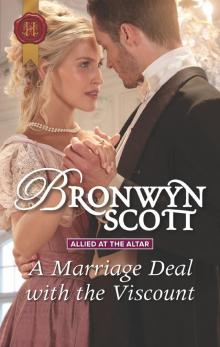 A Marriage Deal with the Viscount--A Victorian Marriage of Convenience Story
A Marriage Deal with the Viscount--A Victorian Marriage of Convenience Story One Night with the Major
One Night with the Major The Passions of Lord Trevethow
The Passions of Lord Trevethow Grayson Prentiss's Seduction
Grayson Prentiss's Seduction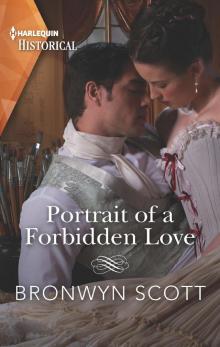 Portrait of a Forbidden Love--A Sexy Regency Romance
Portrait of a Forbidden Love--A Sexy Regency Romance Innocent in the Prince's Bed
Innocent in the Prince's Bed Marrying the Rebellious Miss
Marrying the Rebellious Miss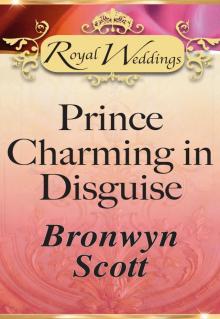 Prince Charming in Disguise
Prince Charming in Disguise How to Disgrace a Lady
How to Disgrace a Lady Secrets of a Gentleman Escort
Secrets of a Gentleman Escort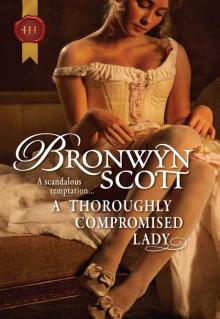 A Thoroughly Compromised Lady
A Thoroughly Compromised Lady Rake Most Likely to Seduce
Rake Most Likely to Seduce Compromised by the Prince's Touch
Compromised by the Prince's Touch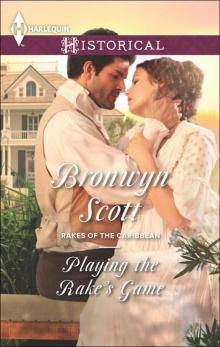 Playing the Rake's Game
Playing the Rake's Game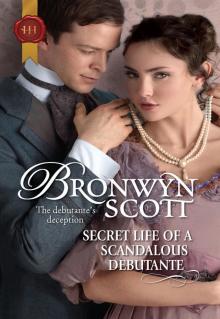 Secret Life of a Scandalous Debutante
Secret Life of a Scandalous Debutante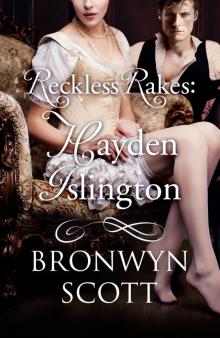 Reckless Rakes - Hayden Islington
Reckless Rakes - Hayden Islington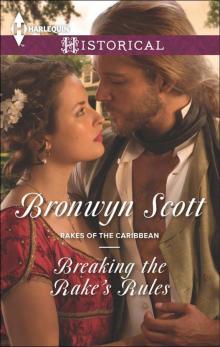 Breaking the Rake's Rules
Breaking the Rake's Rules Arabian Nights with a Rake
Arabian Nights with a Rake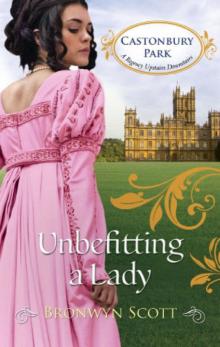 Unbefitting a Lady
Unbefitting a Lady Unbuttoning the Innocent Miss (Wallflowers to Wives)
Unbuttoning the Innocent Miss (Wallflowers to Wives) London's Most Wanted Rake
London's Most Wanted Rake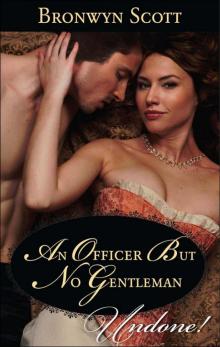 An Officer but No Gentleman
An Officer but No Gentleman A Lady Dares
A Lady Dares A Most Indecent Gentleman
A Most Indecent Gentleman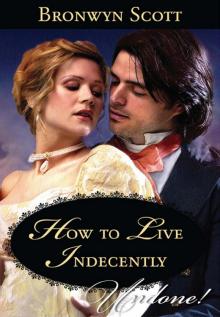 How to Live Indecently
How to Live Indecently Rake Most Likely to Sin
Rake Most Likely to Sin Awakened by the Prince's Passion
Awakened by the Prince's Passion Bronwyn Scott's Sexy Regency Bundle
Bronwyn Scott's Sexy Regency Bundle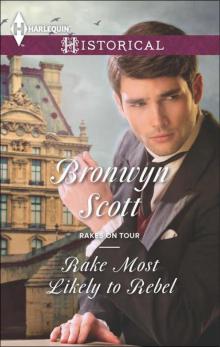 Rake Most Likely to Rebel (Rakes On Tour Book 1)
Rake Most Likely to Rebel (Rakes On Tour Book 1)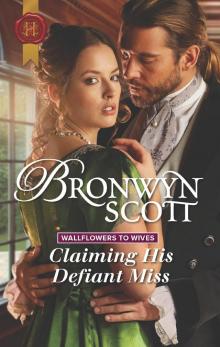 Claiming His Defiant Miss
Claiming His Defiant Miss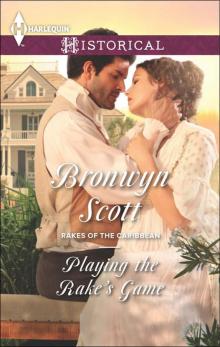 Playing the Rake's Game (Rakes Of The Caribbean Book 1)
Playing the Rake's Game (Rakes Of The Caribbean Book 1)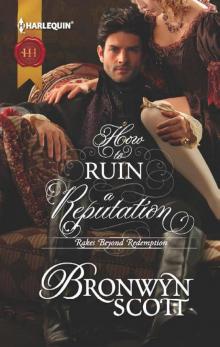 How to Ruin a Reputation (Rakes Beyond Redemption)
How to Ruin a Reputation (Rakes Beyond Redemption)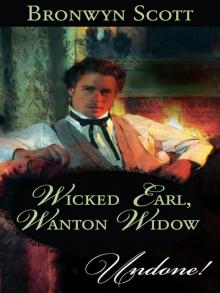 Wicked Earl, Wanton Widow
Wicked Earl, Wanton Widow Seduced by the Prince's Kiss
Seduced by the Prince's Kiss